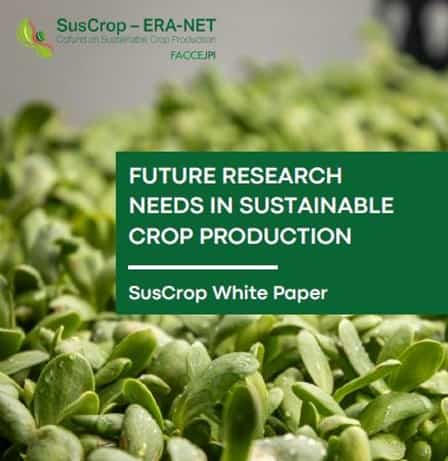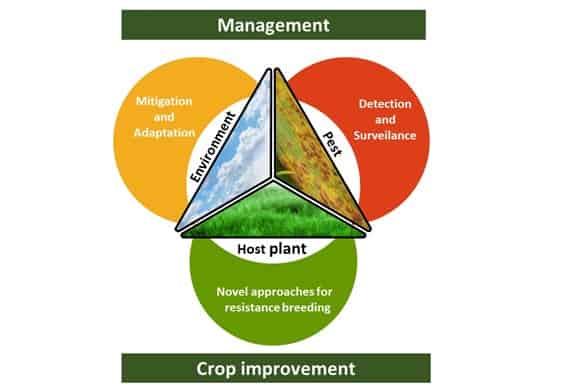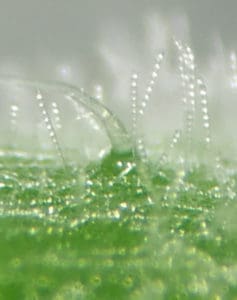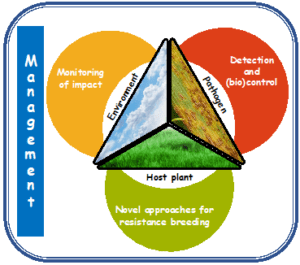NEWS
Stay updated on the latest developments in plant science policy and EPSO activities!
National funders in the European Research Area Network on Sustainable Crop Production (SusCrop ERA-net) together with experts from science and stakeholders developed (supported by 2 workshops) the white paper on ‘Future Research Needs in Sustainable Agriculture’.
The four main research needs are:
- Topic 1: Knowledge generation in relation to nutritional value and health benefits of protein / niche crops;
- Topic 2: Knowledge generation and transfer on multi-stress resistance for stable yield;
- Topic 3: Innovation pipeline: Protein / niche crops for food and feed value chains: How to build a value chain for uncultivated protein / niche crops;
- Topic 4: Impact assessment and trade-offs.
The white paper is available both on the SusCrop website and to download here.
Please disseminate this widely for consideration at European as well as national levels.
Contacts:
Heather McKhann, INRAE & SusCrop ERA-Net (prepared synthesis as white paper)
Christian Breuer, PTJ & SusCrop ERA-Net co-ordinator
Karin Metzlaff, EPSO & official observer SusCrop ERA-Net
Plants comprise the key component for direct or indirect human nutrition. Agriculture must be highly productive and sustainable in order to meet the increasing demand for food, feed, fuel and fibre to support a rapidly growing global human population, as well as reach higher quality providing health benefits.
As a result of the large areas devoted to agriculture and the high demand of resources, the technologies used in the production and protection of plants are most relevant for the global environment.
Pathogens and pests compete with humans for plant-based food. Plant protection to pests in agriculture, horticulture and forestry is the main area of focus for EPSO’s Plant Health Working Group (WG).
In this context, the Plant Health WG proposes to join efforts on three major challenges:
- To develop novel and sustainable pest control methods
- To detect pests that affect plant health and reduce crop yields
- To develop and validate pest and crop management technologies and disseminate them to end users
The Plant Health WG aims to provide tools and raise societal awareness on how plant health protection could contribute to food and nutritional security, sustain farmers’ income, protect biodiversity and reduce impacts on the environment, ensuring high-quality products and boosting economic development. This requires a joint effort and engagement of academia with industry, farmers, citizens, non-governmental organisations and policy makers.
The next meeting of the Plant Health WG will build on this statement and will be announced by the WG Chairs.
Looking forward to further collaborating with you in the Plant Health WG,
Beat, Tina, Maria, Gian Paolo, Andreas and Karin
Plant Health WG co-chairs: Beat Keller, Tina Romeis, Maria Pozo, Gian Paolo Accotto and Andreas Voloudakis.
EPSO Executive Director: Karin Metzlaff
Click here to read: Full ‘EPSO Plant Health statement’
Contacts:
EPSO Plant Health WG Chairs:
Beat Keller, Uni ZUR, CH
Tina Romeis, IPB, DE
Maria Pozo, CSIC, ES
Gian Paolo Accotto, CNR / IT
Andreas Voloudakis, AUA, GR
EPSO: Karin Metzlaff, EPSO Executive Director
The 21st Europe-wide seminar of the series by the European Plant Science Organisation (EPSO) and aimed at the Plant Science community and its stakeholders.
TTT: The seminar will be held online each third Thursday of the month at three (CET).
On 16th March 2023 at 15:00 (CET) we will present three talks exploring “Aspects of Plant Health”
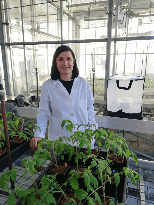
Dr Ainhoa Martinez Medina, CSIC, Spain: “Induced resistance by beneficial fungi against aboveground insect pests: current advances, gaps & perspectives”

Dr Pingtao Ding, University of Leiden, The Netherlands: “Future Challenges & Opportunities of Plant Disease Resistance: A Molecular Point of View”

Assistant Professor Giannis Stringlis, Agricultural University of Athens, Greece: ‘Interplay between plants & their microbiome’
The seminars will be hosted on Zoom and last approximately 1.5 hours. Numbers will be limited to 300 attendees and therefore please register early if you would like to join. There will be ample opportunities to ask questions and join the debate. So please join us to support this new and exciting initiative for European Plant Science by following this link just prior to the start of the seminar.
EPSO members register in advance for this meeting: Zoom link
After registering, you will receive a confirmation email containing information about joining the meeting.
In the coming months we will be on the lookout for talented plant scientists among the EPSO membership to present their findings and perspectives to the EPSO seminar series. If we approach you to talk, we hope you will be happy to support the initiative. This is a fantastic opportunity for both eminent world leaders and talented up-and-coming early career researchers to present their research to an international audience and to network with potential collaborators. If you wish to suggest a theme for one of the spring seminars and / or nominate yourself or one of your colleagues to give a seminar, we most welcome your suggestions. Please contact Tim George ([email protected]) to provide your name and potential talk title.
We look forward to seeing you all for the 21st EPSO seminar on the 16th March 2023
Tim George, Alan Schulman and Marie-Theres Hauser
EPSO Plant Science Seminar Series Organising Committee
Click here to read: Full EPSO news item
Contacts:
Tim George, Hutton / UK & EPSO Board
Alan Schulman, LUKE / FI & Adviser to the EPSO Board
Marie-Theres Hauser BOKU / AT & EPSO Board
EPSO welcomes the European Commission consultation and provides input on the achievements and suggests where improve Horizon Europe and the next Framework Programme (FP) to have a higher impact.
The European Research and Innovation FPs are crucial to enable scientists and innovators across Europe to collaborate to generate knowledge, to apply this knowledge to address today’s and future challenges and to help build a strong, competitive and resilient, inclusive and democratic European society and improve life on earth.
Plant scientists took an active role in the EU FPs from the start and want to contribute in the future.
They are active in pillar 1, mainly in the European Research Council and the Marie Skłodowska-Curie Actions, both working very well.
They could contribute more to pillar 2, particularly in cluster 6 on Food, bioeconomy, natural resources, agriculture and environment. To this end, we suggest the following improvements:
- Further implement the following concepts:
- Address Food and Nutritional Security, environmental sustainability, biodiversity (natural and cultivated) and human health in parallel as much as possible.
- Improve / adapt crops towards ‘Diverse crops for diverse diets and human health and resilient production’.
- ‘Combine approaches on crop improvement, crop management and crop processing’.
- Policy makers should define the goals but leave the pathways to how to achieve these open to the stakeholders
- Create a new heading ‘Enabling sustainable crop improvement’ in the Work Programme and / or partnership ‘CropBooster-Quest’:
- CropBooster-Quest – Plant (systems) biology, crop improvement and plant breeding to achieve a critical mass investment enabling the community to substantially help addressing the challenges mentioned above and interacting with partnerships on biodiversity, agroecology, food systems.
- To bridge the gap until a new partnership can be active, add the heading ‘Enabling sustainable crop improvement’ in the Work Programme.
- Better link the health cluster (1) with the food, agriculture, biotechnology cluster (6) to truly enable plant biologists, breeders, processors, nutritional scientist and health experts to interdisciplinary research and innovation to improve nutritional compounds in plants for the human diet, which are then further protected during crop processing and human digestion. In addition, plant made pharmaceuticals can be co-developed for medical purposes.
All scientists would benefit from more general improvements in pillar 2 across all disciplines and sectors:
- Types of action: Add Research Actions (RAs) in pillar 2 to overcome the gap of collaborative basic research and complete the research and innovation cycle.
- Identify funding priorities: Consult European academic associations. Define the goals, but not the pathways to how to reach these to truly enable innovation.
- Implementation procedures: Increase trust in and flexibility for beneficiaries.
In the EPSO position paper we briefly explain each of these recommendations.
EPSO looks forward to further discuss and help implement these recommendations with colleagues from the European Commission and the Member State ministries and funders.
Click here to read: Full EPSO position paper on Horizon Europe and beyond
EPSO submission to the EC consultation is available here
Contacts:
Karin Metzlaff, EPSO Executive Director, BE
Odd Arne Rognli, NMBU, NO & EPSO President
EPSO is pleased to announce the start of its new Working Group ‘Plant Health’. It will focus on the impact of pathogens and pests onto plants and plant protection in agriculture, forestry and the natural (non-human made) environment. It encompasses the continuum from basic to applied research.
It will link for instance to our Future Proofed Crops WG regarding abiotic stress, water and nutrient use efficiency and photosynthesis, to our Nutritional Security WG on crop nutritional quality and the Tree and Forestry Biology and Biotechnology WG.
The WG will meet first time online on 5th July 2022 to discuss the draft statement on plant health and next steps.
Pls discuss this in your organisation and reply to Karin, cc Sofia and the chairs to become a member of this WG best by end April 2022 (we suggest 1-2 expert scientists per organisation interested in this subject). To enrol an expert, please provide the name, function in the institute, 1-3 keywords on the expertise and contact details. Pls confirm as well if the expert(s) will join the 1st meeting on 5.7.2022.
Interested in the other EPSO WGs?
Discuss in your organisation all EPSO Working Groups (see https://epsoweb.org/working-groups/) and let Karin know if you want to add expert scientists to the other WGs.
EPSO members start and coordinate EPSO Working Groups to collaborate on science advancement, networking, strategy and provide science advice to policy. We suggest that 1-2 expert scientists per member organisation join a WG relevant to them.
Membership in EPSO WGs is restricted to experts from EPSO Institutional members. Others can apply to become and observer of a WG
Looking forward to collaborating with you in the Plant Health WG
Beat, Tina, Maria, Gian Paolo, Andreas and Karin
Plant Health WG co-chairs: Beat Keller, Tina Romeis, Maria Jose Pozo, Gian Paolo Accotto and Andreas Voloudakis.
EPSO Executive Director: Karin Metzlaff
Click here to read: Full ‘EPSO Plant Health WG announcement’ and the ‘EPSO Plant Health Draft statement’
Contacts:
- EPSO Plant Health WG co-chairs:
- Beat Keller, Uni ZUR, CH
- Tina Romeis, IPB, DE
- Maria Jose Pozo, CSIC, ES
- Gian Paolo Accotto, CNR / IT
- Andreas Voloudakis, AUA, GR
- EPSO: Karin Metzlaff, EPSO Executive Director
- Sofia Ciravegna, EPSO Executive Assistant
Plants comprise the key component for -direct or indirect- human nutrition. Agriculture must be highly productive in order to meet the increasing demand for food, feed, fuel and fibre to support a rapidly growing global human population, as well as reach higher quality providing health benefits.
Because of the large areas devoted to agriculture and the large demand of resources, the technologies used in the production and protection of plants are highly relevant for the global environment.
Pathogens and pests compete with humans for plant-based food. The impact of these biota onto plants and plant protection in agriculture, forestry and the natural (non-human made) environment is the main area for the Plant Health (PH) working group (WG) of EPSO.
To sustainably improve plant health specifically in European agriculture, the Plant Health WG proposes to focus on three tasks:
- To develop novel, sustainable pathogen & pest control methods for plant health protection
- To detect pathogens & pests that affect plant health and reduce crop yields
- To develop ready-to-apply pathogen & pest management technologies and disseminate them to end users.
Raising the societal awareness on how plant health protection could contribute to food security, sustain farmers’ income, protect biodiversity and reduce impacts on the environment, ensuring a high-quality product and boosting economic development is a major challenge. This requires a joint effort and engagement of academia with industry, farmers, citizens and policy makers.
This draft statement will be discussed at first meeting of the new EPSO ‘Plant health Working Group online on 5th July 2022.
Looking forward to collaborating with you in the Plant Health WG
Beat, Tina, Maria, Gian Paolo, Andreas and Karin
Plant Health WG co-chairs: Beat Keller, Tina Romeis, Maria Jose Pozo, Gian Paolo Accotto and Andreas Voloudakis.
EPSO Executive Director: Karin Metzlaff
Click here to read: Full ‘EPSO Plant Health Draft statement’
Contacts:
- EPSO Plant Health WG co-chairs:
- Beat Keller, Uni ZUR, CH
- Tina Romeis, IPB, DE
- Maria Jose Pozo, CSIC, ES
- Gian Paolo Accotto, CNR / IT
- Andreas Voloudakis, AUA, GR
- EPSO: Karin Metzlaff, EPSO Executive Director
- Sofia Ciravegna, EPSO Executive Assistant
